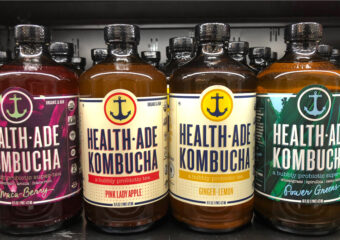How Often Should You Drink Kombucha
If you’re looking for a slightly tangy and fizzy beverage that also offers some potential health benefits, kombucha might be the perfect choice for you. This fermented drink has been gaining popularity in recent years, not just for its unique flavor profile but also for its positive effects on the body.
Kombucha is typically based on a blend of tea, sugar, and a live culture known as a SCOBY (symbiotic culture of bacteria and yeast). Through the fermentation process, kombucha develops a slightly sour taste and a natural effervescence that many people find refreshing. In addition to being a tasty drink, kombucha is usually unpasteurized, meaning it can contain beneficial probiotics and live enzymes that could support gut health.
Some studies suggest that kombucha may have potential health benefits, including improved digestion, better immune function, and even a reduction in the risk of certain chronic diseases. While the scientific evidence is still limited, many people who drink kombucha regularly report feeling better and more energized. Plus, with its low calorie and sugar content, kombucha could be a better choice than other sugary beverages if you’re looking to maintain a healthy diet and lifestyle.
Explore the Potential Health Benefits of Kombucha
When it comes to kombucha, there are a lot of potential health benefits that have been found. For those looking to improve their health, this fizzy fermented tea might be a great choice. Kombucha is a rich source of probiotics, which are healthy bacteria that can benefit your gut microbiome. These bacteria can contribute to a strong immune system and help to protect you against diseases.
One of the benefits of kombucha is its low calorie and sugar count. Though the amount of sugar in commercially bought kombuchas can vary, generally speaking, they contain less sugar than many other beverages. This makes kombucha a good choice for those looking to lose weight or reduce their sugar intake.
In addition to probiotics, kombucha also contains antioxidants. Antioxidants are compounds that can help to protect your cells from damage, reducing the risk of diseases such as cancer. Kombucha also contains small amounts of alcohol, which adds to the fermentation process. However, the alcohol content is usually quite low, so it’s unlikely to have a strong effect on your health.
It’s worth noting that the health benefits of kombucha are still being studied, and there is limited research into its effects. While some people swear by the positive effects of kombucha on their health, others recommend caution. If you’re looking to include kombucha in your diet, it’s probably best to consume it in moderation and not as a replacement for other healthy foods.
- The potential health benefits of kombucha include:
- Probiotics that can contribute to a strong immune system
- Antioxidants that protect against cell damage
- Low sugar and calorie counts
- Small amounts of alcohol from the fermentation process
In conclusion, kombucha can be a great addition to your diet if you’re looking to improve your health. Just remember to consume it in moderation and consider the source (such as commercially bought bottles with a clear label). While there is still more research to be done on the health benefits of kombucha, many people have found it to be a quick and easy way to boost their immune system and overall health.
Understanding the Fermentation Process of Kombucha
Kombucha, a popular fermented tea drink, has gained recognition for its potential health benefits. One of the key factors that sets kombucha apart from other beverages is its fermentation process. Understanding how kombucha is brewed can shed light on its unique properties and potential impact on health.
The Magic of Fermentation
Fermentation is the process by which bacteria and yeast interact to break down sugars in the tea, creating a tangy, effervescent beverage. This natural fermentation process not only adds flavor complexity to the drink but also contributes to its potential health benefits.
Kombucha typically contains a small amount of alcohol due to the fermentation process, though usually in very limited amounts – usually less than 0.5%. This makes it a great option for those looking for a low-alcohol or non-alcoholic replacement to traditional alcoholic beverages.
What’s in Your Brew?
The fermentation process of kombucha involves various bacteria and yeasts, which work together to create a unique flavor profile. Some of the key components in kombucha include acetic acid, lactic acid, and gluconic acid, which contribute to the tangy taste and potential health benefits of the drink.
| Component | Function |
|---|---|
| Acetic acid | Contributes to the acidic taste |
| Lactic acid | May help in reducing inflammation |
| Gluconic acid | May support a healthy gut microbiome |
Depending on the brewing process and ingredients used, kombucha can vary in its content of these acids and other components. This variation can result in a diverse range of flavors and potential health benefits in different kombucha products.
While kombucha is generally considered safe for most people, pregnant women and individuals with compromised immune systems may want to limit their intake due to the unpasteurized and fermented nature of the drink. It’s recommended to consult with a healthcare professional or dietitian before adding kombucha to your daily diet.
Understanding Kombucha Ingredients and Recommendations
When it comes to kombucha, understanding its ingredients and recommended intake is crucial for enjoying this fermented drink to its fullest potential. Kombucha typically contains a mix of tea (such as black or green tea), sugar, starter culture, and a SCOBY (symbiotic culture of bacteria and yeast). These ingredients work together during the fermentation process to create the tangy, slightly effervescent beverage that so many people love.
Though kombucha might resemble beer in terms of its brewing process, the end product is non-alcoholic and is a popular choice among health-conscious individuals. Kombucha is often bought in bottles or cans, with serving recommendations varying depending on the brand. It’s important to note that not all kombuchas are created equal; some may contain added sugars or flavors, so it’s best to read the label for transparency.
Key Nutritional Components in Kombucha
- Kombucha is a good source of probiotics, which can help support a healthy immune system and gut health.
- It contains polyphenols, antioxidants that may help reduce inflammation and oxidative stress in the body.
- Some kombuchas offer small amounts of fiber, though the exact amount can vary.
When it comes to recommendations for consuming kombucha, dietitians and fitness experts mention that moderation is key. It’s easy to get carried away with this fizzy drink, but remember that excessive consumption may cause bloating or digestive issues for some individuals. The best practice is to limit your intake to a serving or two per day, especially if you’re new to fermented beverages.
Some people, especially those with conditions such as diabetes, high cholesterol, or weakened immune systems, might want to consult with their healthcare team before incorporating kombucha into their diet. It’s also important to keep in mind that unpasteurized kombucha can be a breeding ground for harmful bacteria. If you’re not sure about the safety of a specific kombucha brand, it’s best to consult with a healthcare professional.
In conclusion, kombucha can be a healthy addition to many people’s diets, offering a range of potential health benefits. Whether you’re looking to boost your immune system, feed your gut with probiotics, or simply enjoy a tangy beverage, kombucha has something to offer. Just remember to consume it in moderation and choose unpasteurized options carefully to avoid any potential risks. With the right approach, kombucha can be a magic elixir that fits into anyone’s diet and lifestyle.
How to Take Kombucha for Better Immune Health
If you’re wondering what all the hype around kombucha is about, you’re not alone. This fizzy, fermented beverage has gained popularity in recent years for its potential health benefits, including the ability to boost your immune system. So, what’s the best way to incorporate kombucha into your diet to reap these immune-boosting benefits?
First and foremost, it’s important to note that not all commercially bought kombucha products are created equal. Some may be loaded with added sugars and artificial flavors, which can negate the positive effects of the drink. When choosing a kombucha product, look for whole, live ingredients and limited processing to ensure you’re getting the most health benefits.
When it comes to intake recommendations, it’s best to start slow and gradually increase your consumption. Most dietitians suggest starting with a serving or two per day and gradually increasing to up to three servings. However, everyone’s body is different, so listen to your body and adjust your intake based on how you feel.
When it comes to flavor, there are many options to choose from, such as black tea, fruit juices, and even more exotic varieties. Ultimately, the flavor you choose is up to personal preference, so experiment with different options to find what you enjoy most.
It’s worth noting that while kombucha can have potential benefits for your immune system, it’s not a magic cure-all. It’s just one part of a healthy diet and lifestyle. If you’re pregnant or have any health conditions, it’s always best to consult with a healthcare provider or dietitian before adding kombucha to your diet.
In conclusion, incorporating kombucha into your diet can be a great way to boost your immune health. Just remember to choose wisely when selecting a product, start slow with your intake, and listen to your body to determine what works best for you. With these tips in mind, you’ll be well on your way to reaping the potential immune-boosting benefits of kombucha.






